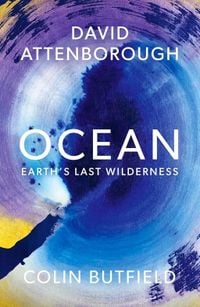Sir David Attenborough, the legendary natural historian and voice of the natural world for nearly 80 years, marked his 99th birthday on May 8 with a message that carries particular urgency for Greece: protect the sea, and the sea will, in turn, protect us. In his latest documentary Ocean, which premiered this week and is being screened internationally, Attenborough makes one of his most powerful statements yet: “After almost 100 years on the planet, I now understand the most important place on Earth is not on land, but at sea.”
The film, a stark yet hopeful exploration of the world’s oceans, underscores the critical role marine ecosystems play in climate stability, food security, and planetary health. And it carries a message especially relevant for Greece, a country defined by the sea, yet one where ocean literacy remains low and environmental priorities often clash with economic pressures.
Attenborough, who first spotlighted Greece’s natural heritage in his 1987 series The First Eden, now turns the spotlight back with an implicit challenge: will Greece answer the call to protect its marine legacy? With a maritime border of nearly 13,700 km and over 3,000 islands, Greece’s identity, culture, and economy are inseparable from the Aegean and Ionian Seas. Yet despite widespread public concern about climate change, urgent environmental action often takes a back seat to more immediate concerns — from geopolitical tensions to the ongoing cost-of-living crisis.
Among the most contentious issues is the government’s continued support for fossil fuel exploration, particularly LNG projects. Environmental groups warn these plans threaten marine biodiversity and are at odds with EU climate targets. Greece’s booming shipping industry, a cornerstone of the economy, also remains a significant source of marine pollution. The government’s plans to deregulate mining this summer could pose further risks to coastal ecosystems.
Still, signs of hope are emerging. On May 8, the Greek Parliament ratified the landmark International Treaty on the High Seas, a global effort to protect waters beyond national jurisdictions. And just last month, following years of delays, Greece submitted its long-awaited maritime spatial plans to the EU — a step aimed at coordinating sustainable activities such as fishing, aquaculture, and renewable energy in its coastal zones.
At the 2024 Our Ocean conference in Athens, Prime Minister Kyriakos Mitsotakis announced Greece’s intention to expand marine protected areas (MPAs) to cover 30% of Greek waters by 2030 and pledged a ban on destructive bottom trawling in national marine parks — a long-standing demand from conservationists. Grassroots initiatives also offer glimmers of optimism. In Amorgos, local fishers have voluntarily created no-catch zones to restore depleted stocks. Meanwhile, Greece’s iconic loggerhead turtles, Caretta caretta, are beginning to rebound thanks to sustained protection efforts.
These small but meaningful actions echo one of Attenborough’s most compelling insights: “If we just let nature take its course, the sea will save itself.” As Greece stands at a crossroads, Attenborough’s voice — calm, wise, and urgent — reminds us that preserving our marine ecosystems is not just an environmental imperative but a moral one. For a nation surrounded by blue, the path forward is clear: act boldly, act now, and let the sea recover. Happy 99th birthday, Sir David Attenborough. Your call to protect the oceans resonates deeply — from the shores of the Galápagos to the islands of Greece.
A new clip from the documentary Ocean has highlighted the devastating effects of bottom trawling. The film, which has been released worldwide to coincide with Attenborough's 99th birthday, puts a spotlight on the challenges that our ocean is currently facing – as well as how it holds the key to a flourishing planet. The heart-wrenching footage featured in the clip is the first time the process of bottom trawling was filmed in such high quality. The ocean floor is dredged by iron chains, with fish of all kinds being swept up into the net. Attenborough reveals that trawlers, often on the hunt for a single species, discard over three quarters of their catch, remarking, “it’s hard to imagine a more wasteful way to catch fish.” The discarded fish are simply “thrown away” and swept back into the sea. An area almost the size of the Amazon rainforest is trawled every year, with the same places being trawled repeatedly.
It’s a heartbreaking irony – one not lost on Sir David Attenborough – that in his long lifetime, scientists’ knowledge of the natural world has increased dramatically while nature has suffered devastating losses over the same period. Meanwhile, our appetite for David’s powerful storytelling is as insatiable as ever, and his new film and book make a formidable case for change. These creative outputs are reflections of a life told through the lens of nearly a century of marine discovery, destruction, and glimpses of recovery.
The book of Ocean contains different stories and subject matter to the film but shares the message of hope. Parallels are drawn with the ninety-year lifetime of a blue whale; it’s a handy device to chart the magnitude of change over this period. The longevity of this magnificent creature is striking against the backdrop of historic events, and we become immersed in a whale’s eye view of the world as the largest animal on the planet moves mesmerisingly through a vast expanse of currents in search of krill, its tiny prey. Everything about it is huge, and we are in awe as it swallows 80,000 litres of krill and water in one gulp; but unease follows as the damage caused by humans to the ocean inevitably raises a question over the future of this and countless other species.
David writes of living almost a hundred years during which time, “Marine science has revealed natural wonders a young boy in the 1930s could never have imagined. New technology has allowed us to film wildlife behaviour I could only have dreamed of recording in the early stages of my career, and we have changed the ocean so profoundly that the next hundred years could either witness a mass extinction of ocean life or a spectacular recovery.”
Ocean is gripping. It dives into some key habitats, meets intriguing characters, explores the challenges they face, and seeks solutions. In the Kelp Forest chapter, it recounts the rousing tale of this habitat’s recovery from wipe-out to an official no-trawl zone off the south coast of the UK. Smooth hound shark, blenny, rare angel shark, and the electric ray are gradually returning thanks to the radical action of some remarkable individuals and organizations like Sussex Wildlife Trust. Protection requires governments everywhere to act, and it’s up to us all to hold them to account.
In this country, our Marine Protected Areas are still ravaged by bottom trawling. This has to stop. How else can we reverse decades of decline? It would also help if we avoided building developments such as wind farms in these designated sites. We urgently need to tackle climate change – but it’s an own goal to damage the living seabed and its precious blue carbon stores. Emma Robertshaw works for The Wildlife Trusts.
As we reflect on David Attenborough’s remarkable journey and his unwavering commitment to our planet, his latest work serves as a clarion call to action. The ocean, with all its beauty and fragility, demands our respect and protection. The next generation deserves a thriving marine environment, and it is up to us to ensure that future generations inherit a healthier planet.





